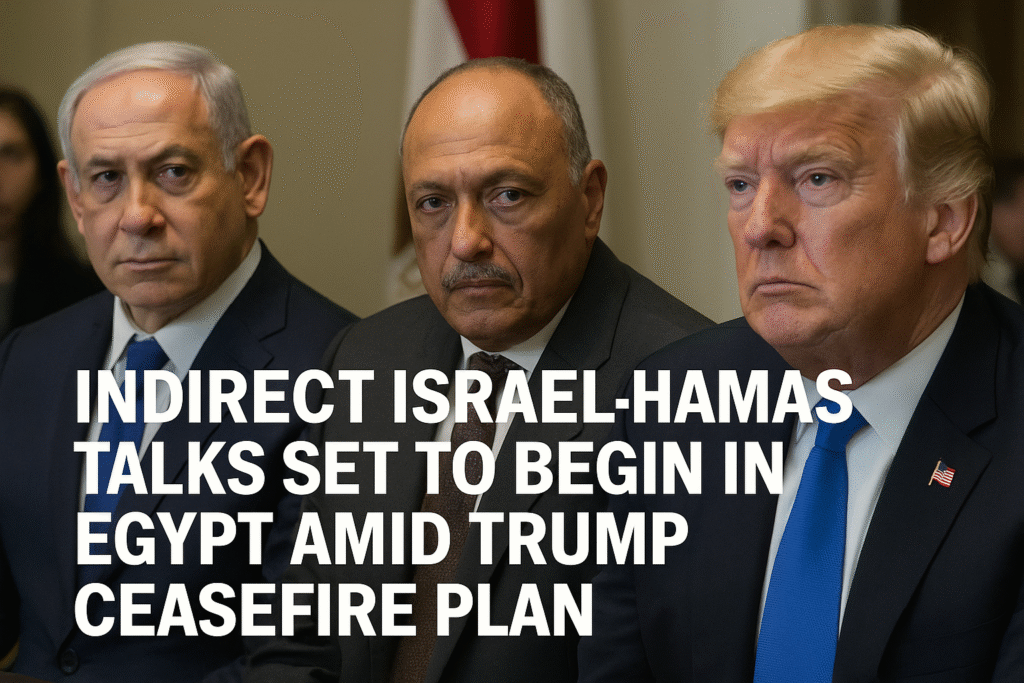By Harshit | October 5, 2025 | Sharm el-Sheikh, Egypt
Indirect negotiations between Israel and Hamas are scheduled to begin tomorrow in Sharm el-Sheikh, Egypt, officials confirmed, marking a critical step toward implementing US President Donald Trump’s 20-point ceasefire proposal.
Also known as proximity talks, these discussions aim to finalize the mechanisms for a phased agreement, including the release of hostages held in Gaza and the gradual cessation of hostilities. Sharm el-Sheikh, located at the southern tip of the Sinai Peninsula, has historically hosted multiple rounds of Middle East peace talks, making it a familiar diplomatic venue.
Israel Credits Gaza Offensive for Ceasefire Breakthrough
Speaking today at a state memorial ceremony, Israeli Defense Minister Israel Katz claimed that the military’s ongoing operations in Gaza City created the conditions for Trump’s initiative.
“The reason for the possible reversal in Hamas’s position is the intensity of the pressure Israel is exerting on the city of Gaza,” Katz said. “The occupation of Gaza City has placed enormous pressure on Hamas and created the basis for President Trump’s decisive initiative.”
Katz also emphasized that Israel expects the first stage of the ceasefire to be implemented soon, calling for the immediate release of all hostages. He warned Hamas that refusal to comply would result in an escalation of military action.
Prime Minister Benjamin Netanyahu similarly expressed hope that all Israeli hostages could be freed within days, while IDF forces remain deployed deep inside Gaza.
Ceasefire History and Current Stakes
The ongoing conflict between Israel and Gaza militants has resulted in significant civilian and military casualties. According to the Palestinian Ministry of Health, more than 67,000 Palestinians, including over 17,000 children, have been killed since the war began. On October 7, 2023, Hamas and other militant groups killed approximately 1,200 Israelis and kidnapped more than 250 others.
There have been two previous ceasefires since the conflict began. The first, in November 2023, lasted only a week, during which 105 hostages were released in exchange for scores of Palestinian prisoners. A second ceasefire occurred in January 2025, shortly before Trump’s return to office. During its first phase, Hamas freed 33 hostages while Israel released around 50 Palestinian prisoners for each Israeli returned.
However, the planned second stage, which included a permanent ceasefire, collapsed when Israel resumed its offensive on March 18, arguing that renewed military pressure was necessary to secure the release of remaining hostages.
International Endorsement of Hamas’ Response
Foreign ministers from Qatar, Egypt, the UAE, Saudi Arabia, Indonesia, Pakistan, and Turkey have publicly endorsed Hamas’ acceptance of Trump’s ceasefire framework.
In a joint statement from the Saudi Foreign Ministry, the ministers said they “welcomed the steps taken by Hamas regarding U.S. President Donald Trump’s proposal to end the war on Gaza, release all hostages, alive or deceased, and immediately launch negotiations on implementation mechanisms.”
The statement further praised Trump’s call for Israel to halt bombings and commence the exchange process. “Such developments represent a real opportunity to achieve a comprehensive and sustainable ceasefire and address the critical humanitarian conditions facing people in Gaza Strip,” the statement noted.
Officials stressed the urgency of beginning negotiations immediately to agree on mechanisms that would implement the proposal and address all aspects of the plan.
Humanitarian Concerns and Ongoing Risks
Despite diplomatic momentum, Gaza remains a dangerous combat zone. Israeli forces continue to control strategic positions within the city, and airstrikes and artillery fire have inflicted further damage to civilian areas. Aid organizations warn that overcrowding in designated “safe” areas in southern Gaza has left many displaced families with no shelter.
Civilians, mediators, and international observers are cautiously optimistic but recognize the fragility of any agreement. Analysts note that while the Trump plan provides a framework, the negotiations’ success will depend on the willingness of both Israel and Hamas to implement commitments without backtracking.
As indirect talks commence in Sharm el-Sheikh tomorrow, the world will closely watch whether this new diplomatic effort can finally bring an end to a conflict that has caused immense suffering on both sides.

